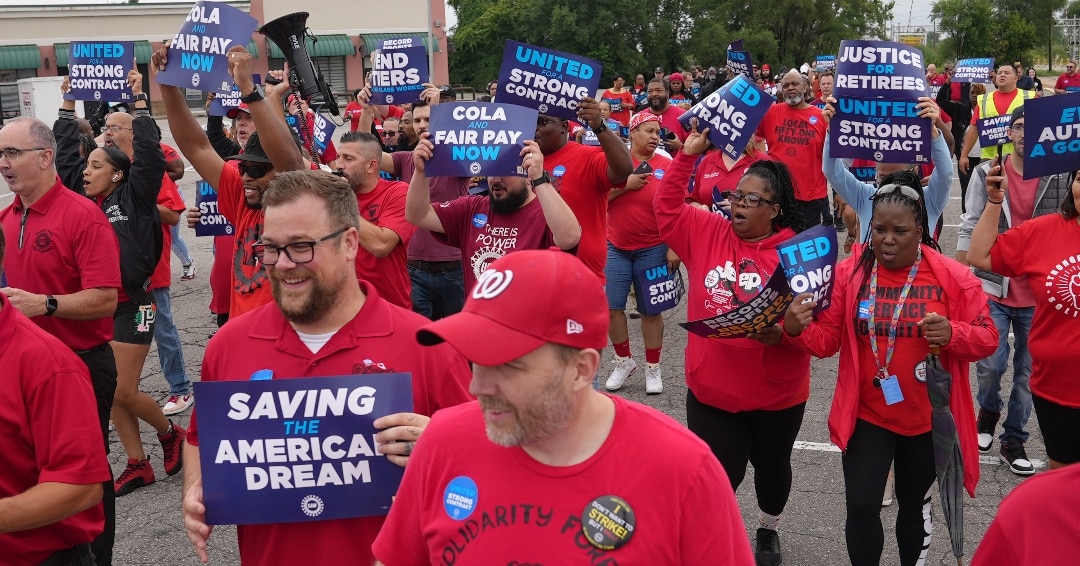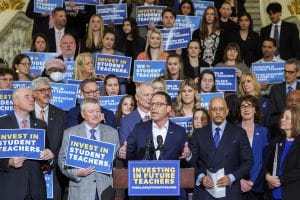These days, organized labor appears to be doing better than it has in decades. The Teamsters, the United Auto Workers, the Screen Actors Guild, and the Writers Guild all won major gains after large-scale collective bargaining campaigns this year. Can organizers build on this momentum? What tactics will work and what challenges lie ahead?
Kate Bronfenbrenner, a leading labor academic and director of labor education research at Cornell University’s School of Industrial Relations, provided The Progressive with some insight on the future of labor.
Q: Some say that because American unions are organized by Locals rather than industrywide, they are ineffective. They think that Locals are mainly interested in maintaining their own fiefdoms rather than organizing industry-wide campaigns like those seen in Europe. Is that criticism valid?
Kate Bronfenbrenner: The definition of a Local is so different with each union, that you can’t really say that. In SEIU (Service Employees International Union), for example, the Locals are bigger than probably more than half of the unions in the United States. In other unions, like the Steelworkers, the Locals are each plant. [With] SEIU, most of the organizing is happening at a Local.
READ: PA01 Congressman Brian Fitzpatrick Kicks Off New Congress with Union Busting Vote
It is more that there are small Locals that don’t have the resources. In some unions, the leaders work part-time in the bargaining unit, and the International is not giving them the funding, [so] yes, there is going to be an issue. [There are] organizing drives where the Locals all connect with each other and the International is not doing any organizing but the Locals go and organize. There is really so much variety that you can’t make a statement like that.
Q: UAW President Shawn Fain announced that all three contracts the union recently signed with Ford, General Motors, and Stellantis are set to expire on April 30, 2028. He urged other unions to coordinate to ensure their collective bargaining agreements expire on that same date to maximize their leverage when negotiating new contracts. How significant a break does Fain’s approach represent with past practices?
Bronfenbrenner: It is something that happens and when it happens, it is a great thing. It is very hard to do co-determinate [simultaneous] expiration dates. Nursing home chains, if they don’t have co-determinate expiration dates when the unions try to do a strike, the companies will just move the patients from one nursing home to another. To get co-determinate expiration dates, employers know it increases worker power, so they will fight it. You have to strike to get it, plus you have to convince workers to postpone raises and things like that in order [to gain] this long-term benefit of having a co-determinate expiration date. So it is hard. But when you have them, you have enormous power.
What Fain did was aspirational. He was trying to inspire the labor movement. He got [co-determinate dates] for the UAW and, of course, the more unions that have that expiration date, the better.
Q: California Governor Gavin Newsom recently signed a bill into law setting up a Fast Food Council between unions representing fast food workers and the fast food industry in California. Through the council, workers should have a stronger say in setting minimum wages and working conditions, including health and safety standards. Other states have passed similar laws. Some see this legislation as a big move away from locality-based bargaining. Would you agree?
Bronfenbrenner: We have to be careful about calling [labor/industry councils] bargaining. In many ways, it is lobbying in many of the states, similar to the Fight for $15, getting a statewide wage. To do bargaining you have to get the employers on board. You are increasing the power by bringing these groups together, but are the employers on board? If there isn’t some mandatory government system that forces the employers to bargain with the council and the industry, there is no mechanism for that…Employers would never agree to it.
But what it does do is it gives these entities validity as a force that [represents]the fast food workers, the low wage workers. Some of this is happening without any regulation. SEIU has this organization [called the] United Southern Service Workers that is organizing low wage workers of color all across the South.
READ: Five Critical Lessons From UPS’s Union Workers
They are trying to get the wages raised by lobbying for legislation. They are not going to the employers for this. It does not mean [labor/industry councils] are not an important step . . . . This has been a way to improve some health and safety conditions and raise wages. But the problem is that the employer is not obligated, you can’t enforce it if they refuse.
Q: Do the pro-labor rulings by President Joe Biden’s National Labor Relations Board make it easier for unions to bargain by industry and call general strikes?
Bronfenbrenner: There [are] a lot [of] things that the Biden board [is] doing that are very good. I hesitate to say that these things are really there yet because employers are challenging them and going to the courts and the courts are all Trump courts . . . . Jennifer Abruzzo [NLRB general counsel] and the NLRB have made it easier to organize by just proactively moving cases through by using injunctive relief . . . being very creative in how to come up with the greatest penalties you can within the limits of the [National Labor Relations] Act.
But there is nothing in it to force the employer to bargain a contract. As we see for all the new organizing that is happening in retail, Amazon, Starbucks, not a single one of those new places has gotten a first contract. My research shows that within two years of the election, only 50 percent get a first contract. After more than three years, there are over one-third that don’t have a first contract and may very well never get one.
Q: Public opinion has recently swung dramatically in favor of unions and striking workers. Is this a factor in making it easier for unions to bargain?
Bronfenbrenner: The same things that have caused public opinion to rise [in support of unions] are the same things that are inspiring workers to organize and strike. The anger over the incredible disparity between corporate wealth and workers’ wages. A stagnating economy. The fact that corporations made huge profits during [the COVID-19 pandemic] and were not willing to take care of their workers and put their workers and customers and others at risk.
They feel what the workers are saying resonates with their own experience. Does that mean we are going to get a general strike? Public support for strikes is great, but to do a general strike you have to get the whole labor movement on board. We have enormous variation in our labor movement. We have unions that are so far from striking, they never strike. They would be very hesitant to strike.[There are some] unions that when necessary will strike, but a general strike, with that coordination of getting all the unions, that is going to take leadership at all levels who support it, and a willingness to go on strike even when you are not protected.
Q: Are the joint strikes of the Hollywood studios by the Writers Guild of America (WGA) and the Screen Actors Guild (SAG-AFTRA) a good example of a successful broader strike?
Bronfenbrenner: Yes, and it is an example that could inspire others . Being able to do it together gave them so much more power. The studios could not function.
Q: In a recent article for In These Times, labor journalist Hamilton Nolan asserted that without an enormous multi-union campaign, Amazon will never be organized, nor will the tech industry, nor will the South.
Bronfenbrenner: I have made that same statement for decades, but I would add one more word to his sentences: It has to be a global multi-union campaign.
Q: Is there anything else you’d like to add?
Bronfenbrenner: There’s no question we are in a moment. There is a surge in organizing. There is public support. Workers are angry. We have had these moments before, and they faded when you shifted towards a more antagonistic administration in Washington, or when there was some kind of crisis like a war.
In the late nineties, we were in a very similar position.
There were a lot of strikes, including the UPS strike, a wave of organizing, really large units organizing. But labor was very much beginning to connect globally. You had U.S. unions, Teamsters, Steelworkers, marching at the WTO [the World Trade Organization meetings in Seattle in 1999].
READ: Baristas of the World Unite! Starbucks Workers in Whitehall Unionize
Then 9/11 happened, and those more militant and radical challenges to capital [became] ‘If we do any kind of action like that, is it going to violate the Patriot Act? Is it going to be seen as unpatriotic because we are at war with Afghanistan?’ There was a real chilling effect. And you saw them all back down. We saw that again when the Trump Administration came in and made all these executive orders and board decisions making it much harder to organize.
If labor does not take advantage of it, and doesn’t mount these large significant campaigns then this moment will disappear just as it has before.
This article was originally published in The Progressive and reprinted here with permission.






